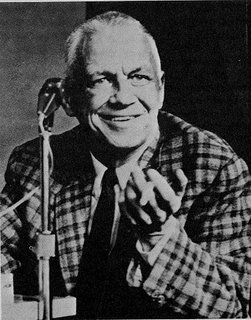Who Cares What's "Really" Conservative?

What is conservatism? Ask this question and you get a hundred different answers. Does conservative politics have anything to do with conservative dressing, or the conservative temperament, or conservative investing? That such questions even have to be asked points up the problems in the word "conservative." Perhaps deliberately, this nineteenth century choice for a term to replace the outmoded "Tory" party label, from the beginning carried with it so many extraneous associations, that everyone can see in it what they personally love and call that "real" conservatism.
I was planning a big post on this issue. I was going to hang it on Jeffrey Hart's widely discussed article in the Wall Street Journal in which he argues that true conservatism means reverence for the beauty of the environment, ritual and metaphysical religion, a willingness to live with the social reality of abortion, a rejection of democracy promotion abroad, and a social base in the well-educated sectors of the populace, especially in the Northeast and university towns. True conservatives, he argues, oppose the Republican party. (A bit counter-intuitive, that.) The other person I was going to hang it on is Edward Feser's response, arguing that Jeffrey Hart's positions merely reflects the philosophical incoherence in American conservatism in general. Following Richard Weaver, he argued that real conservatism must be based in Platonic metaphysics, in the idea that universals are real things existing apart from human thought, not just concepts we invent, or still less mystifications that hide reality. Only by a metaphysical theory of the person, for example, can we assert that abortion is wrong even if society favors it. (Of course Plato himself in his Republic supported the infanticide of unfit children, while envisioning a Sparta-style society with a few androgynous group-marriage guardians ruling by means of state-supported lies. Well, that's a detail, don't let it distract you.) Now we have the Crunchy Cons debate, which is getting me, like Jonah Goldberg, "vexed and perturbed."
But most of what I have to say was already said by Willmoore Kendall in his response to Richard Weaver and Russel Kirk's attempt to define conservatism. In his classic, The Conservative Affirmation in America (find it here), Willmore Kendall pictured an opponent saying to those enthusiastic about Weaver and Kirk:
"Sir, your procedure appears to be the following: you start out from the fact that you feel yourself a Conservative; your Conservatives are merely the people you find saying or writing things in response to which your own heart goes pit-a-pat; your Conservative creed is merely your creed; your Conservatives are, so to speak, a club, in which you admit or blackball members according as they can or cannot reproduce your pronunciation of 'shibboleth.'" (pp. xxiii-xxiv).
By contrast Willmoore Kendall approached "What is a Conservative" as an observer of facts:
I begin my search for Conservatives where my greatest teachers have taught me a political inquiry ought to begin, namely down in the political marketplace -- where Americans are disputing the issues that they deem decisive as regards the future character and destiny of our political society. My Conservatives are, I like to think, "given" to me by the realities of American politics; my own agreement or disagreement with them is not in point. If I do happen to agree with them, that is because of a choice I have made among alternatives that I am not myself in a position to affect. To put it otherwise, I assume in this book that rightful ownership of the label "Conservative" has been, and will continue to be, decided in another place and independently of any mere book writer's personal preferences (and -- dare I add? -- idiosyncrasies and unbought graces of life). In a pinch, indeed, I'll just give up on the word "Conservative," and say to some of my friends, "You can have it to fight over as you like." But the realities of American politics will remain just what they were before that gesture of humility and renunciation on my part. . . .
My Conservatives are men who have taken a stand, on issues that are a) important and b) relevant -- that is "up." Indeed, not the least of my quarrels with those other books I have in mind is that they are so preoccupied with what writing-men have written that they overlook, or give wide berth to, the issues that are "up" -- are in the process of actually being decided in a way that will affect events -- and tacitly suggest that Conservatism does or conceivably could do otherwise. (p. xxiv)
. . .
in any given time and place Conservatives are those who are defending an established order against those who seek to undermine or transform it. . .
I make no sense, that is to say, of calling "Conservative" the man who takes a dim view of his country's established institutions, feels something less than at home with its way of life as it actually lives it, finds it difficult to identify himself with the political and moral principles on which it has acted through its history, dislikes or views with contempt the generality of the kind of people his society produces, and -- above all perhaps -- dissociates himself from its founders, or at least holds them at arms' length. Such a man may be the better or nobler or wiser for all this dim-viewing and the yearning-away-from; he may be right as rain. But I fail to see where you can get by calling him a Conservative (or where he gets by calling himself one) (p. xxv).
Sometimes Willmoore Kendall didn't take his own advice ("dim-viewing" and "yearning-away-from" the rather settled results of Civil War, for example), but the principle remains, to my mind, right as rain.
<< Home